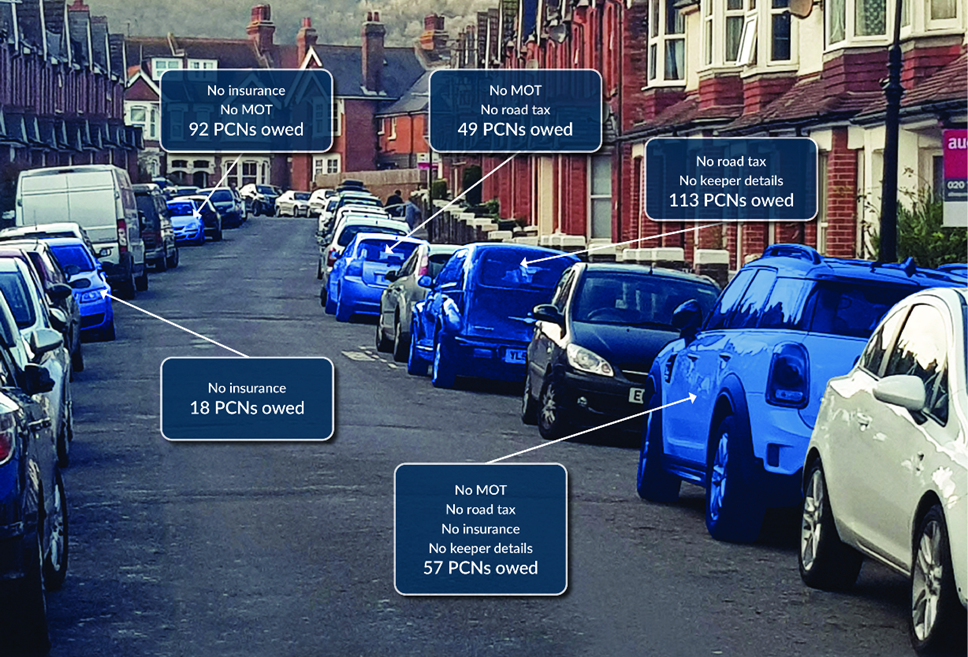
Nuisance Vehicles
Nuisance vehicles include those that have either three or more unpaid penalty charge notices (PCNs), no road tax, no valid MOT, or no insurance.
The image above depicts a typical street - perhaps similar to the one where you live? Not only do nuisance vehicles make our roads less safe, an estimated half billion pounds is owed to local authorities in unpaid PCNs. The BPA and a BPA member are leading the search for a solution, to support local authorities to recoup money owed and make our streets safer.
Persistent evaders
A subsection of road users are persistent evaders – those that do not comply with government requirements for roads to be safe to use. Not paying PCNs, not properly insuring a vehicle, not paying vehicle excise duty or driving a vehicle that has no registered keeper. While these may appear to be relatively innocuous individual offences these road users increase the risk of harm to others including pedestrians and there can be serious consequences. For example, financial loss for third parties hit by uninsured drivers, not being able to identify a responsible individual in a hit-and-run when there is no registered keeper. There is evidence that correlates some persistent evaders to more serious criminality, and them being of interest to the police, for reasons beyond non-compliant road use.
Persistent evaders was included as one of many areas to address in the Department for Transport’s 2020 Roads Safety Review following the publication of the Road Safety Statement in 2019.
Persistent evaders of PCNs
PCN persistent evaders are motorists that have three or more unpaid PCNs. Research on parked vehicles in the South Coast, Essex and West Midlands showed that forty percent of persistent evaders had vehicles that also did not have insurance or an MOT, and in some cases lacked both. Often the vehicle is not registered with the DVLA and does not have road tax. Every vehicle that does not have an MOT and is uninsured makes our roads unsafe for other motorists and pedestrians.
Thousands of motorists make themselves invisible to local authorities by not registering their vehicle with the DVLA, or giving them incorrect information. Without the correct address enforcement agents are then unable to collect the debt and it often has to be written off.
Legislation
Currently under the Traffic Management Act local authorities and enforcement agents acting on their behalf can only take action against persistent evaders when the vehicle has a PCN on the windscreen and only this PCN can be recovered. It is simply not cost effective for local authorities to recover the lost revenue. In 2008 London Councils tried to rectify this when it implemented the London Local Authorities and Transport for London Act 2008, but it's never been used, as the the code of practice for this legislation is unworkable.
PCN persistent evader research
A wide range of transport sector agencies and government are aware of the need to tackle nuisance vehicles and encourage cross-working. The persistent evader research data was included in a road safety programme called Tutelage supported by the Association of Chief Police Officers, Highways England and working with Motor Insurance Bureau to tackle the one million uninsured vehicles on our roads. The outcome from sending warning letters to uninsured drivers resulted in 80% uptake within 30 days of receiving the letter.
Cross government and agency working
Since 2019 the National Police Chiefs Council, DfT and Home Office have worked together and this work now sits within the remit of the DfT’s Roads Policing Review. This work proposes a range of proof of concept pilot activities, some of which include tackling persistent evaders and multiple offenders with the most effective combination of targeted compliance and enforcement interventions. We are working with partner agencies including DVSA, DVLA and Highways England to tackle the common challenge of nuisance vehicles and now updating the London Local Authority Code of Practice. It is hoped the changes will make it useable, fairer, and importantly encourage compliance amongst the nuisance vehicle community. Following this, the revised Code of Practice will be trialed in London with a view to it being transposed to the rest of England if approved.
In response to a question from Josh Babarinde in the Commons, the previous Secretary of State for Transport, Louise Haigh, said that the Department for Transport would be working with various stakeholders on the matter.
National Fraud Initiative (NFI)
We have recommended to government that the NFI's data sharing powers should be expanded to include the collection of public debt, and in particular persistent evader debt. See our response to the Cabinet Office consultation on the NFI's expansion of data sharing powers here.
Join the campaign
We encourage the public and our members to support this important campaign, to make our roads safer and enable local authorities to collect money that is owed to them, which is public debt. For more information contact the Public Affairs team.
Useful links
The persistent evader research by a BPA member featured in Parking News and Politics First.
Persistent evader data was used within the Information Commissioners Office Sandbox to improve road safety in 2021
* Joint report from BPA and a BPA member Nuisance motorists in our communities.
